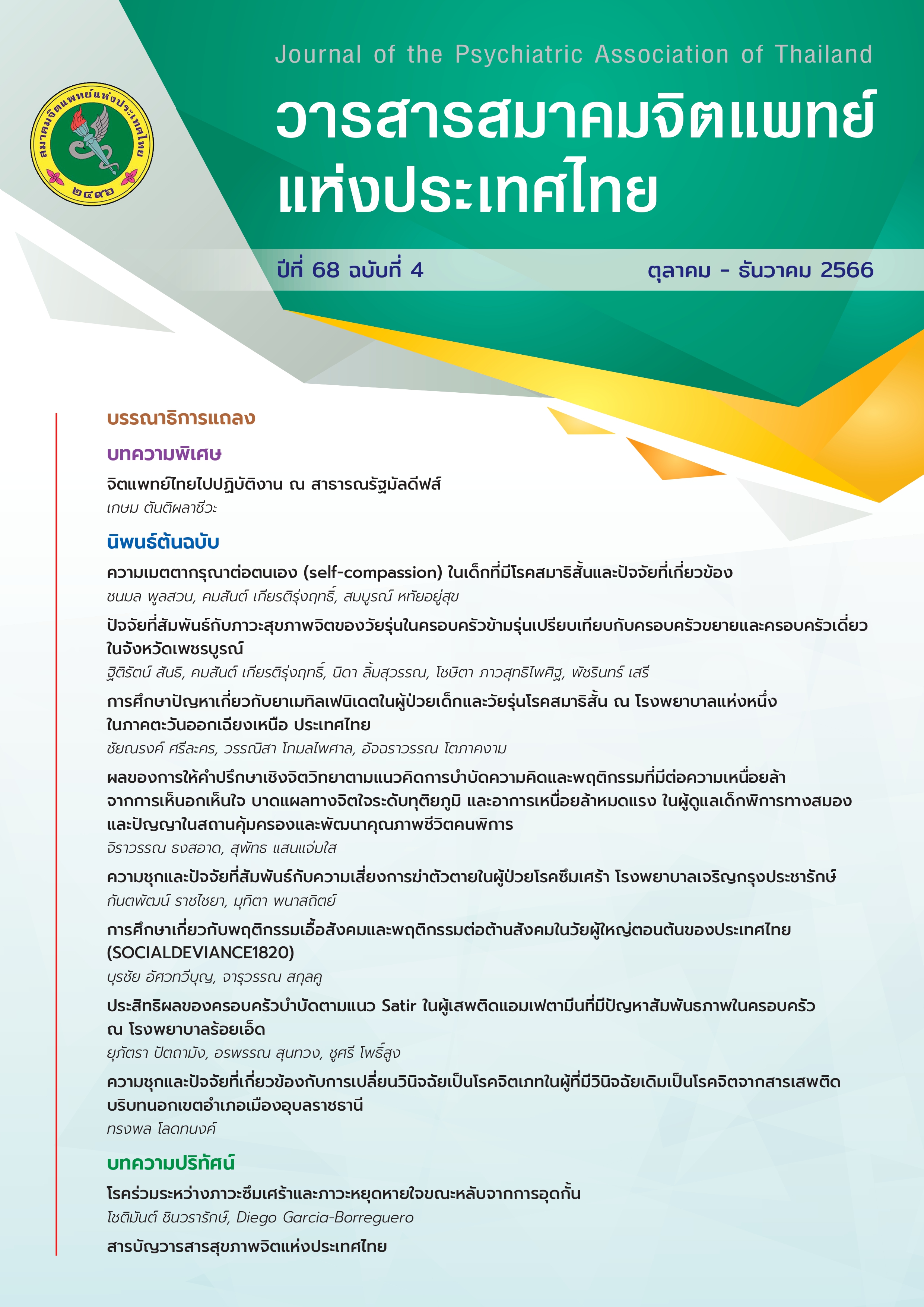Effectiveness of Satir Family Therapy on amphetamine addiction and family relationship at Roi Et Hospital
Main Article Content
Abstract
Objective: To compare the mean score of amphetamine addiction, family relationship before and after receiving the Satir-based family therapy and after one month of follow up.
Method: This study was a quasi-experimental research. The subjects consisted of two groups. Group 1: twelve amphetamine addicted patients, aged between 20- - 59 years,visited the out patient department, Roi Et Hospital. Group 2: twelve patients’ family members who lived in the same house with the patients and involved in family relationship problem. All participants received one-month of Satir family therapy and assessed by the amphetamine addiction assessment form and the family relationship assessment form before and after the therapy and after one month of follow-up. Descriptive statistics and paired sample t-test were used for all data analysis.
Results: After the therapy and after one month of follow up, the study showed statistically significant that amphetamine addiction patients had lower scores of amphetamine addiction (mean difference=13.67;95% CI =-15.18 - -12.15; p-value<0.05). In terms of family relationship, it was found that amphetamine drug addicted patients and their families had significantly higher mean family relationship scores (mean difference=2.59 ; 95% CI =2.41 – 2.77 ; p-value<0.05).
Conclusion: This study showed that a Satir family therapy model can reduce amphetamine addiction and improve family relationship. Therefore, this program should be applied to the treatment of amphetamine addicted patients with family relationship problem.
Article Details

This work is licensed under a Creative Commons Attribution-NonCommercial-NoDerivatives 4.0 International License.
Articles submitted for consideration must not have been previously published or accepted for publication in any other journal, and must not be under review by any other journal.
References
United Nations Office on Drugs and Crime (UNODC). Patterns and trends of amphetamine-type stimulants and other drug. United Nation publication;2021.
Office of the Narcotics Control Board: Ministry of Justice. Report drug problem situation in Thailand [Internet].2022[cited 2022 Mar 20]; Available from: https://data.oncb.go.th/bst
Soontornchoti M, Uthis P. Selected factors related to resilience to amphetamine use of adolescents receiving treatment, out patient department, eastern region hospital. J Psychiatr Ment Health Nurs 2013; 27(2): 85-98.
Jhanjee S. Evidence based psychosocial Interventions in substance use. Indian J Psychol Med 2014; 36: 112-118.
Rattanasumawong W, Kalayasiri R, Saengcharnchai P. Current models of addiction and controversy. J Psychiatr Assoc Thailand 2018; 63(3): 295-306.
Mungkung W, Wacharasin C, Deoisres W. Family factors Influencing substance abuse in male adolescents at a juvenile vocational training centre. PHJBUU 2016;11(2):53-63.
Hiranyatheb T, Udomsubpayakul U, Kongsakon R. Factors associated with non-relapse in clients who completed the rehabilitation programme in compulsory treatment system for drug addiction. J Psychiatr Assoc Thailand 2013;58(2):157-164.
Minuchin S. Families and Family Therapy. Cambridge, MA:Harvard University;1974.
Satir V. The Satir model. California: science and behavior books;1991.
Suvanchot KS, Somrongthong R, Phukhao D. Efficacy of group motivation interviewing plus brief cognitive behavior therapy for relapse in amphetamine use with co-occurring psychological problems at southern psychiatric hospital in Thailand. J Med Assoc Thai 2012;95(8):1075-1080.
Chuaycharoen P, Chaipichitpan N, Meesil W. Effectiveness of family therapy program for drug dependent patients and their family. J DMS 2015;40(2):80-93.
Sisangsong S, Uthis P, Suktrakul S. The effect of multidimensional family therapy program on amphetamine consumption in adolescent with amphetamine dependence. J Psychiatr Ment Health Nurs 2019;33(2):76-90.
Ritmoontree S. Effect of group Satir model based program on self-esteem enhancement of amphetamine dependence in compulsory rehabilitation. J DMS 2021;46(1):80-93.
Maarefvand M, Aghaei H, Hosseinzadeh S, Abbasi M, Khubchandani J. Effectiveness of Satir-Informed family-therapy on the codependency of drug dependents’ family members in Iran: a randomized controlled trial. J Evid Inf Soc Work 2017;14(4):301-310.
Dattalo P. Determining sample size: balancing power, precision, and practicality. New York: Oxford University Press;2008.
Intasithi J. Family relationship and attitude toward pregnancy of pregnant women with nausea and vomiting. Bangkok: Mahidol University;2002.


